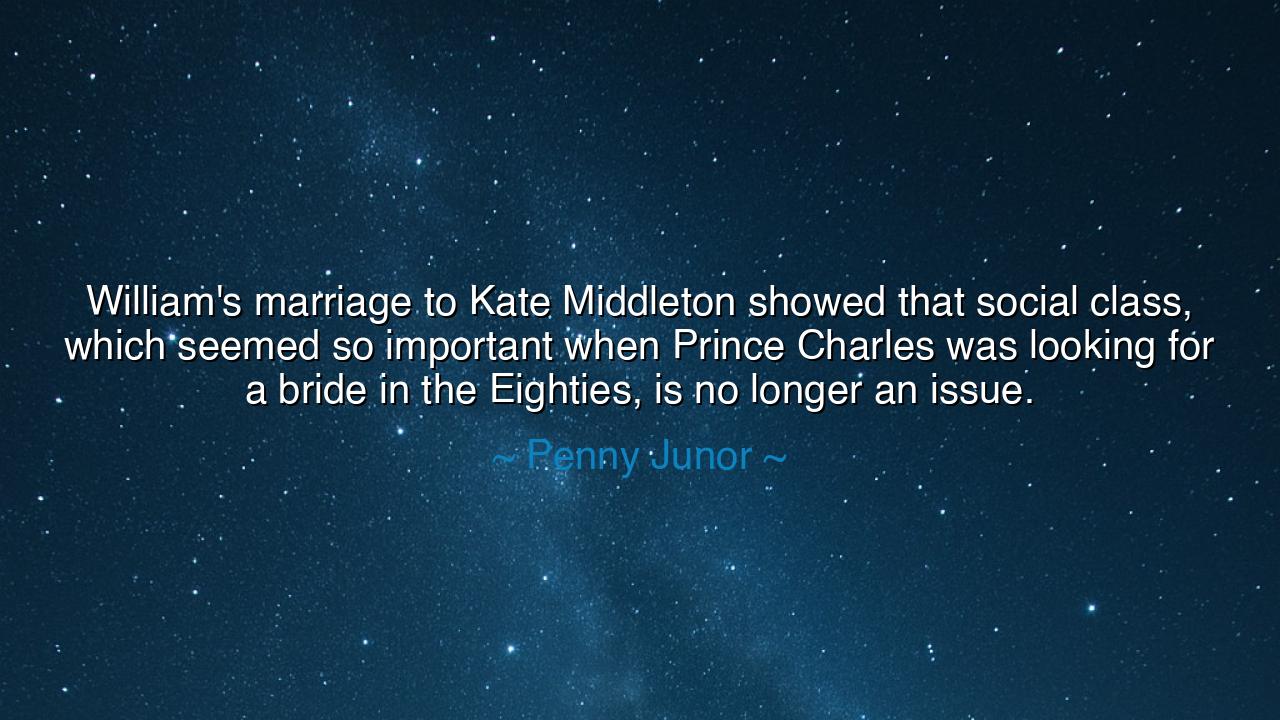
William's marriage to Kate Middleton showed that social class
William's marriage to Kate Middleton showed that social class, which seemed so important when Prince Charles was looking for a bride in the Eighties, is no longer an issue.






“William’s marriage to Kate Middleton showed that social class, which seemed so important when Prince Charles was looking for a bride in the Eighties, is no longer an issue.” — Penny Junor
In this reflection, Penny Junor speaks not merely of a royal union, but of a quiet revolution in the heart of British society. The marriage of Prince William and Kate Middleton was more than a wedding — it was a symbol, a sign that the walls once built to separate the “noble” from the “common” had begun to crumble. Her words speak to the death of an old order — one that measured worth not by virtue, wisdom, or love, but by the accident of birth. Through this union, the world witnessed something profound: the royal blood of centuries embracing the pulse of ordinary humanity.
In ages past, social class was a fortress. The crowns and titles of Europe guarded their lines fiercely, demanding that marriage serve not love, but lineage. Kings and princes wed for alliances, not affection; their unions were maps of power, not of hearts. When Prince Charles, decades earlier, sought a bride, it was said that she must be not only virtuous but noble-born — “fit,” in the eyes of tradition, to join the royal bloodline. Thus was Lady Diana Spencer, herself from aristocracy, chosen, and though her heart brought compassion and warmth to millions, her marriage proved that love cannot thrive under the weight of duty alone.
But time, as it always does, wore away the iron gates of tradition. When Prince William, the son of that same troubled union, looked upon Catherine Middleton, he saw not title but truth. She was no duchess by birth, no heiress of empire, but a woman of education, grace, and dignity — her family rising not from ancient nobility, but from honest work. Their love grew not in the glare of ceremony, but in the quiet halls of friendship and mutual respect. In choosing her, William did not only follow his heart; he rewrote the script of monarchy itself.
Junor’s observation captures the deep shift in human values: that character now outweighs class, and love is no longer bound by lineage. In a world once divided by invisible walls, the royal family’s embrace of a “commoner” became an emblem of modernity. It said to the people — not only of Britain but of all nations — that nobility can be earned, not inherited. That grace can live in every household, not only in palaces. And that in the eyes of the future, the measure of greatness is not one’s ancestors, but one’s actions.
History offers many parallels. When King Edward VIII abdicated the throne for love of Wallis Simpson, an American divorcée, the act was scandalous — a rebellion against an age obsessed with propriety. But William’s choice, generations later, was not met with exile, but with celebration. Society itself had changed. The chains of hierarchy had loosened, and what once was a rebellion had become a renewal. In this way, progress is often born not from loud revolutions, but from quiet choices — a marriage, a gesture, a symbol of love that dares to transcend the lines drawn by custom.
Still, Junor’s words remind us that this transformation did not come easily. The journey from class privilege to social equality is not yet complete — in Britain or anywhere. But each act of defiance against outdated division moves humanity closer to wholeness. When a prince marries a woman of the people, when a nation cheers not for a title but for a union of equals, something ancient is healed: the false belief that one’s birth determines one’s worth.
So let this be the teaching drawn from this royal tale: no destiny is fixed by blood, and no heart is too humble for greatness. The world changes not only through battles and laws, but through moments when love chooses courage over convention. Let all who hear remember — the truest nobility is not in heritage, but in humility; not in rank, but in righteousness; not in birth, but in the capacity to love beyond boundaries. For when love dares to cross the lines drawn by history, it becomes the most powerful force of all — one that can dissolve centuries of division and awaken the eternal truth that all souls are born equal under heaven.






AAdministratorAdministrator
Welcome, honored guests. Please leave a comment, we will respond soon